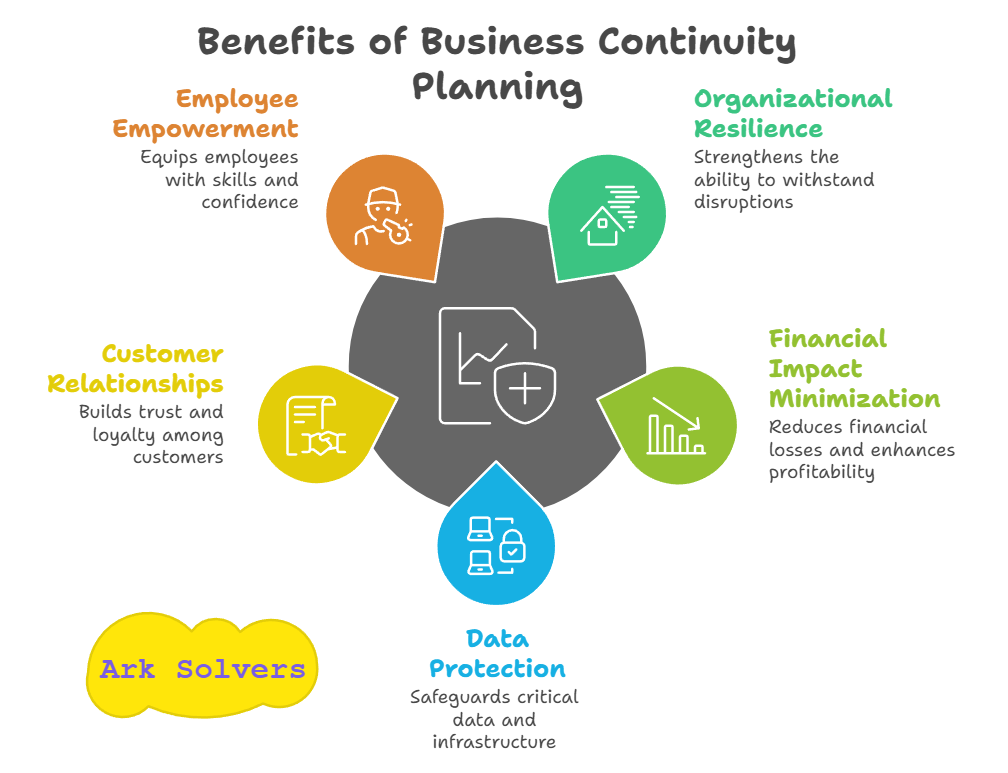Key Benefits of Business Continuity Planning

Key Benefits of Business Continuity Planning
In today’s fast-changing world, many things can disrupt businesses. These include natural disasters, cyber threats, and supply chain problems. Companies that focus on business continuity planning (BCP) do well. They can handle tough times and keep running smoothly.
Ark Solvers, a top tech company, is a great example. Thanks to its strong BCP plan, it has dealt with many crises.
So, what are the main benefits of business continuity planning? How can it help your company do well even when things get hard? Let’s dive into this to find out. See how Ark Solvers’ strategy can guide your path to success.
Key Takeaways
- Understand the fundamental principles of effective business continuity planning.
- Explore how BCP can safeguard your organization’s critical operations and data.
- Discover the long-term financial benefits and cost savings enabled by robust BCP.
- Learn how BCP enhances organizational resilience and adaptability.
- Explore the role of BCP in maintaining customer trust and market position.
Understanding Business Continuity Planning Fundamentals
Ark Solvers is a top business advisory firm. They know how crucial business continuity planning (BCP) is today. BCP helps companies prepare for and deal with problems, keeping important work going smoothly.
Read More: What is Business Continuity? A Complete Guide
Core Components of an Effective BCP
A good BCP has a few main parts: risk assessment, business impact analysis, recovery plans, and emergency steps. Ark Solvers helps clients spot dangers, see how big they could be, and find ways to lessen risks. This ensures that businesses can keep going strong.
The Evolution of Business Continuity Management
Business continuity management has changed a lot over time. Ark Solvers keeps up with these changes. They update their plans to follow the latest trends and best practices, like keeping data safe and working from anywhere.
Role of Risk Assessment in Planning
Risk assessment is key for Ark Solvers’ BCP. They look closely at risks like natural disasters, cyber-attacks, and work stoppages. This helps clients make strong BCPs, focusing on the most important tasks and protecting important things like data and buildings.

Key Benefits of Business Continuity Planning
A good business continuity plan (BCP) is very important at Ark Solvers. It helps any company, big or small. A strong BCP brings many benefits that make a company strong, keep it running, and keep people trusting it. Here are the top five benefits:
- Enhanced Organizational Resilience: A good BCP helps your company deal with big problems like natural disasters or cyberattacks. It keeps your important work going and protects your good name and place in the market.
- Minimized Financial Impact: A BCP cuts down on lost time and quickly gets things back to normal. This saves money and can make you money in the long run by getting better insurance deals and keeping people happy.
- Robust Data and Infrastructure Protection: A full BCP includes strong security, ways to get back data, and safe systems. It keeps your most important things safe from harm.
- Strengthened Customer Relationships: Keeping your business running smoothly builds trust and loyalty with your customers, making your company stronger and more competitive.
- Empowered Employees and Supply Chain: A BCP gives your team the skills and plans to handle problems. It also makes your supply chain stronger by managing vendors well.
A good business continuity plan is key in today’s fast-changing business world. Companies like Ark Solvers can be more resilient and adaptable using the five key benefits of business continuity planning. This puts them ahead of the competition and helps them succeed for a long time.
Minimizing Financial Impact Through Effective Planning
Ark Solvers knows that planning for business continuity is key. It’s about more than just keeping things running. It also helps save money when things go wrong. A good plan can save a lot of money and strengthen a company.
Direct Cost Savings from Reduced Downtime
Good planning means less time stopped. When disaster hits, a solid plan helps get things back on track quickly, saving money and keeping income coming in.
It also avoids big costs like extra staff and repairs, which add up fast when you’re not ready.
Long-term Financial Benefits
Planning for business continuity also brings long-term gains. A strong plan makes a company more flexible and ready for anything. This means less financial hit when trouble comes.
Being quick to respond helps keep customers happy and builds trust. This is good for business and helps it grow over time.
Insurance Premium Advantages
Companies with good plans might pay less for insurance. Insurers see these companies as safer bets, and they show they’re ready for disasters.
This can lead to better deals on insurance. It makes a company even more financially stable.
Read More: What are the 6 Pillars of Business Continuity?
Enhanced Organizational Resilience and Adaptability
Ark Solvers knows today’s business world is always changing. We help organizations stay strong and keep working during crises, and our plans improve their handling of emergencies.
At Ark Solvers, we make businesses more resilient. This allows them to face surprises with ease, deal with disasters, cyber-attacks, and other problems, and keep serving their customers and staying strong.
- Strengthening an organization’s ability to adapt to changing circumstances
- Enabling companies to maintain critical operations during crises
- Fostering a culture of preparedness and risk-mitigation
- Minimizing the impact of disruptions on day-to-day business activities
At Ark Solvers, we understand each client’s special risks. We perform detailed risk checks and make plans just for them, which helps them overcome many kinds of problems.
Ark Solvers helps clients improve their bounce-back ability. We strengthen them and prepare them for challenges, keeping them ahead even when things get tough. They stay safe, maintain their good name, and stay strong for a long time.
Read More: What are the 5 Steps of a Business Continuity Plan?
Protecting Critical Business Operations and Data
At Ark Solvers, we know how important data protection and cybersecurity are today. We use strong cybersecurity to ensure your business is safe, keeping your important work and data safe.
Cybersecurity Integration
We incorporate cybersecurity into our business plan to combat cyber threats. We use top security steps and watch for dangers, keeping your data and systems safe even when things go wrong.
Data Recovery Strategies
We know data is key to your business. So, we have plans to get your data back fast. We back up your data, store it safely, and have extra systems. This way, you can return to work quickly if something goes wrong.
Infrastructure Protection Measures
We also protect your physical and digital stuff. We use strong security, backup power, and extra ways to talk. This keeps your business running smoothly and safe from problems.
At Ark Solvers, we help you with business plans and keep things safe. We protect your business and data, helping your business stay strong against any challenge.
Maintaining Customer Trust and Market Position
Ark Solvers knows that keeping customer trust is key to success. A good business plan helps maintain trust and protect the company’s image when times are tough.
Ark Solvers shows it can reliably deliver important work and services even when faced with surprises. This makes it a reliable and trustworthy partner. It helps build stronger customer ties, loyalty, and a market edge.
Ark Solvers’ focus on business plans shows that it cares about preserving customer trust and protecting its market position. Clients feel safe knowing their needs are met, even in crises, which boosts their enhanced customer trust in the company.
Ark Solvers tackles possible problems and has strong recovery plans, which shows it’s good at reputation protection and makes it stand out as a trusted leader in its field.
Employee Safety and Operational Continuity
At Ark Solvers, we know how important it is to keep employees safe and work smoothly. Good business plans do more than protect data and buildings; they also focus on keeping employees safe and ready.
Emergency Response Protocols
Our business plan has strong emergency rules. These rules tell us how to act in emergencies like natural disasters or cyber-attacks. This way, we can keep our work and team safe.
Remote Work Capabilities
Working from home is key today. Ark Solvers ensures your team can work well even when they’re not in the office. This keeps your work going and keeps everyone safe.
Staff Training and Awareness
Teaching your team is key to keeping everyone safe and work going. Ark Solvers trains your team on how to handle emergencies, work from home, and stay safe online. This makes your team strong and ready for anything.
At Ark Solvers, we care about keeping employees safe and work going. We have strong plans for emergencies, remote work, and training. This helps your team stay safe and work well, even when things get tough.
Supply Chain Resilience and Vendor Management
At Ark Solvers, we know how important a strong supply chain is. We help keep businesses running smoothly by planning for the unexpected. This makes sure goods and services keep flowing smoothly.
We help clients find weak spots in their supply chains and plan for them. This includes having backup suppliers and managing inventories well. It also means working closely with key vendors. This way, companies can quickly adjust and avoid big losses.
Good vendor management is key to Ark Solvers’ approach. We check suppliers carefully and ensure their reliability. We also review and update these relationships often. This helps everyone work together better and bounce back quickly when trouble hits.
FAQ
What are the key benefits of business continuity planning?
Business continuity planning helps a lot. It cuts down on downtime and money lost. It also makes a company stronger and more reliable. Plus, it keeps customers happy and follows the rules.
It also prepares employees for problems. This planning is key to keeping things running smoothly when things go wrong.
Why is business continuity planning important?
It’s vital for keeping a business going. It protects important data, keeps customers trusting the company, and helps companies bounce back fast after big problems.
This planning makes a company strong and ready for anything. It helps them stay ahead in a competitive world.
What are the main objectives of a business continuity plan?
The main goals are to keep key parts of the business safe, reduce lost time and money, keep employees safe, and keep customers happy.
It helps a company get back on track quickly, making it more resilient and ready for any challenge.
What are the disadvantages of business continuity planning?
There are some downsides. It can cost a lot at first. It also takes time and effort to create and maintain the plan.
But the benefits are worth it. A strong plan means less financial loss and happier customers, and it makes a company more resilient in the long run.
What are some common examples of business continuity plans?
There are many types of plans. Disaster recovery and incident response plans are common, as are crisis management and supply chain plans.
These plans help protect important operations, keep communication going, and ensure a quick recovery from problems like natural disasters or cyber-attacks.
Which component is an important strategy of business continuity?
Risk assessment is key. It helps identify and address threats. By knowing the risks, companies can focus on the most important ones.
This way, they can use their resources wisely. It makes their business continuity plan more effective.
Who must have a business continuity plan?
Every organization needs a plan, big or small. A plan is essential for staying strong and keeping important functions running during tough times.
What are the steps in business continuity management?
There are several steps. First, do a business impact analysis. Then, identify what’s most important and develop recovery plans.
Next, create an incident response plan. Implement it, test it, and keep improving it. This will keep the plan working well, even as threats and business needs change.


